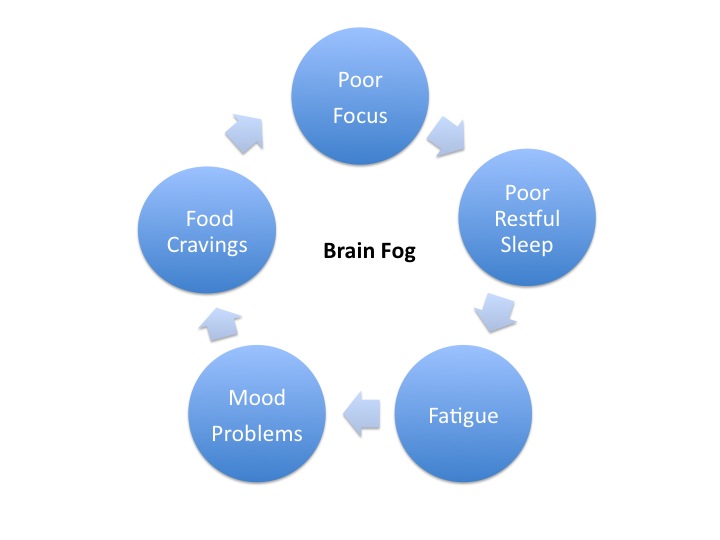Understanding Brain Fog Part 1 – Symptoms

Are you experiencing the symptoms of brain fog?
Many of us have experienced brain fog at some point in our lives ; waking up in a mental daze even though we slept perfectly well the night before , as we go to leave the house we can’t find our wallets or keys to the car, even though we put them down only a moment ago . Our concentration and focus is shot to pieces, our performance at work sufferers and we move through our lives for weeks, months or even years at a time in a mental fog, with our minds and thoughts constantly darting around with no steady pattern or method. Our thinking is not as sharp as it once was and we feel a small shift in the way our brain functions and even though this feeling may come and go periodically, the frequency of episodes may be increasing but it’s hard to tell because your thinking is clouded If all or part of this scenario sounds familiar, the chances are that you are suffering from the very modern malaise called brain fog and it is more common than you think.
Brain fog is more common than you think
Brain fog is an extremely common condition that has grown exponentially over the past two decades. Its increase has been linked to the digital revolution, our accelerated consumption of technology and the inevitable information overload. While many people can go through their entire lives without realising they are experiencing the symptoms of brain fog and begin to operate and conduct their daily lives consistently under-performing and experiencing the world around them through the equivalent of dark glasses that cannot be removed .It becomes the norm. Most importantly many individuals who exhibit typical symptoms of brain fog fail to realise that their mental condition is entirely reversible or preventable and even though it is not medically recognised illness amongst the medical profession, most doctors acknowledge an increase in individuals complaining of reduced mental functioning popularly called (for the lack of a proper medical term and in the parlance of our time) brain fog.
Brain fog is not inevitable and can be eliminated
Many individuals who exhibit the symptoms of brain fog attribute this often sudden mental decline to the daily stresses of living in the modern age (this almost certainly is correct in part) or being a natural and normal result of the ageing process , one that cannot be reversed or altered because it is inevitable This way of thinking is simply incorrect and can prevent many from seeking the kind of help or taking the kind of simple steps to clear their brain fog once and for all .The reality is that any individual, of any age , who are suffering from the symptoms of brain fog can quickly experience significant improvements in their mental performance by acknowledging the symptoms of and then tackling some or all of the many underlying triggers that cause brain fog to occur Therefore, in order for you to clear your foggy brain the first step is to examine your symptoms and then the causes of these symptoms, before finally seeking the most appropriate natural treatment to restore your mind back to peak performance.
Some common signs of brain fog
There are a number of indicators that can show if you are experiencing the symptoms of typical brain fog and the most common are:
- Sudden occurrences of memory loss with a noticeable and sudden decline in your short-term memory capacity.
- An inability to navigate familiar spaces and places with a natural ease.
- General feelings of fuzziness and a marked inability to think coherently and clearly.
- The constant feeling that your mind is moving through a thick fog or haze.
- A reduction in the ability to pay attention and focus on detail.
- Loss of overall mental sharpness and brain performance.
- Difficulty concentrating or a lack of focus when talking to people or when watching a film or reading a book.
- Difficulty in forming sentences verbally or expressing your thoughts to others.
- Feelings of mental exhaustion and an incapacity to absorb new information
- A reduced ability to perform common tasks that are familiar to you.
If you are experiencing some or all of the above then you are most likely to be exhibiting typical symptoms of brain fog and the next stage having noted these manifestations is to understand the likely triggers that cause brain fog to occur and finally to follow some simple steps to clear the fog from your brain once and for all. In the next post I will examine some of the more common triggers of brain fog and then outline a number of simple but effective strategies to help clear your brain fog and improve your mental performance for the long term.
About the Author
Sam Jansen is a leading brain scientist, lawyer and author, studying neuroscience, social behaviors and the science of happiness.You can find him at Google+


















I would add looking at the gut for the complete picture of brain fog, as functional medicine teaches that 80% of the immune system surrounds the gut. That rain forest environment must be healthy for brain to function well.
When is the next installment coming? It seems to me it is the most important.
Thanks for part 1.
James
Nice presentation again with some great examples of experiencing ‘brain fog’.
You can help many here.
Wow this is so me but where is part 2. You can’t just leave us hanging like this!